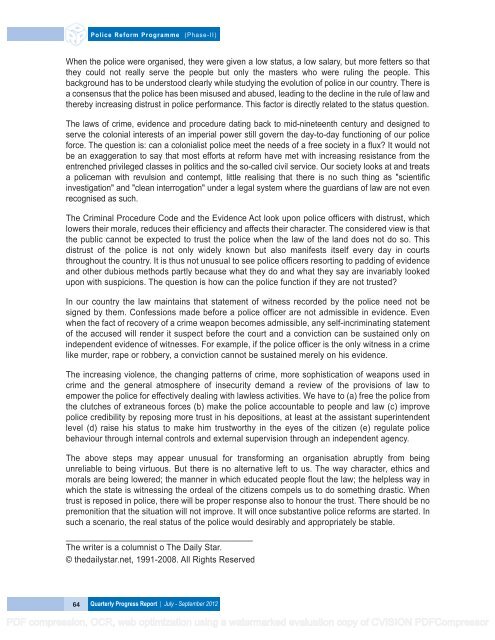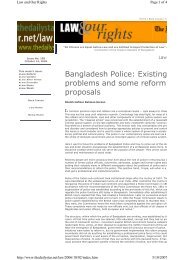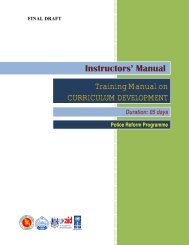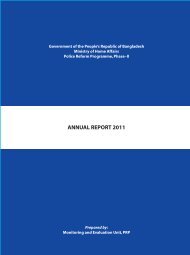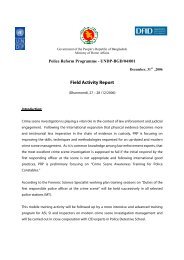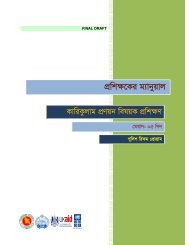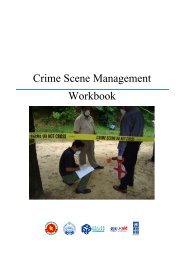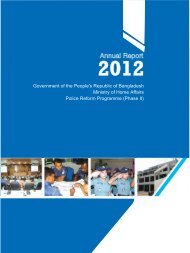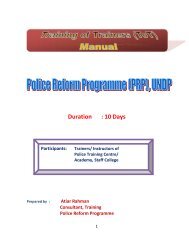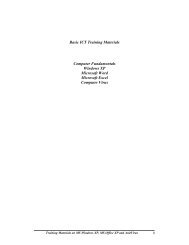QUARTERLY PROGRESS REPORT - Police Reform Programme
QUARTERLY PROGRESS REPORT - Police Reform Programme
QUARTERLY PROGRESS REPORT - Police Reform Programme
Create successful ePaper yourself
Turn your PDF publications into a flip-book with our unique Google optimized e-Paper software.
<strong>Police</strong> <strong>Reform</strong> <strong>Programme</strong> (Phase-II)<br />
When the police were organised, they were given a low status, a low salary, but more fetters so that<br />
they could not really serve the people but only the masters who were ruling the people. This<br />
background has to be understood clearly while studying the evolution of police in our country. There is<br />
a consensus that the police has been misused and abused, leading to the decline in the rule of law and<br />
thereby increasing distrust in police performance. This factor is directly related to the status question.<br />
The laws of crime, evidence and procedure dating back to mid-nineteenth century and designed to<br />
serve the colonial interests of an imperial power still govern the day-to-day functioning of our police<br />
force. The question is: can a colonialist police meet the needs of a free society in a flux It would not<br />
be an exaggeration to say that most efforts at reform have met with increasing resistance from the<br />
entrenched privileged classes in politics and the so-called civil service. Our society looks at and treats<br />
a policeman with revulsion and contempt, little realising that there is no such thing as "scientific<br />
investigation" and "clean interrogation" under a legal system where the guardians of law are not even<br />
recognised as such.<br />
The Criminal Procedure Code and the Evidence Act look upon police officers with distrust, which<br />
lowers their morale, reduces their efficiency and affects their character. The considered view is that<br />
the public cannot be expected to trust the police when the law of the land does not do so. This<br />
distrust of the police is not only widely known but also manifests itself every day in courts<br />
throughout the country. It is thus not unusual to see police officers resorting to padding of evidence<br />
and other dubious methods partly because what they do and what they say are invariably looked<br />
upon with suspicions. The question is how can the police function if they are not trusted<br />
In our country the law maintains that statement of witness recorded by the police need not be<br />
signed by them. Confessions made before a police officer are not admissible in evidence. Even<br />
when the fact of recovery of a crime weapon becomes admissible, any self-incriminating statement<br />
of the accused will render it suspect before the court and a conviction can be sustained only on<br />
independent evidence of witnesses. For example, if the police officer is the only witness in a crime<br />
like murder, rape or robbery, a conviction cannot be sustained merely on his evidence.<br />
The increasing violence, the changing patterns of crime, more sophistication of weapons used in<br />
crime and the general atmosphere of insecurity demand a review of the provisions of law to<br />
empower the police for effectively dealing with lawless activities. We have to (a) free the police from<br />
the clutches of extraneous forces (b) make the police accountable to people and law (c) improve<br />
police credibility by reposing more trust in his depositions, at least at the assistant superintendent<br />
level (d) raise his status to make him trustworthy in the eyes of the citizen (e) regulate police<br />
behaviour through internal controls and external supervision through an independent agency.<br />
The above steps may appear unusual for transforming an organisation abruptly from being<br />
unreliable to being virtuous. But there is no alternative left to us. The way character, ethics and<br />
morals are being lowered; the manner in which educated people flout the law; the helpless way in<br />
which the state is witnessing the ordeal of the citizens compels us to do something drastic. When<br />
trust is reposed in police, there will be proper response also to honour the trust. There should be no<br />
premonition that the situation will not improve. It will once substantive police reforms are started. In<br />
such a scenario, the real status of the police would desirably and appropriately be stable.<br />
________________________________________<br />
The writer is a columnist o The Daily Star.<br />
© thedailystar.net, 1991-2008. All Rights Reserved<br />
64 Quarterly Progress Report | July - September 2012<br />
PDF compression, OCR, web optimization using a watermarked evaluation copy of CVISION PDFCompressor


